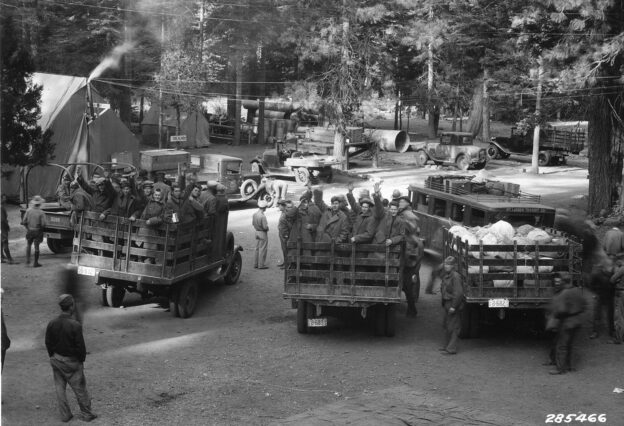This week, in the United States of America, the Biden-Harris administration has launched the American Climate Corps. Formally an interagency initiative of the US Federal government, the ACC has the stated purpose of recruiting thousands of young people, and putting them to work on federal programs aimed at climate change prevention. The idea is to build up a workforce that has the skills necessary to running a successful low-carbon economy going forward.
There are several areas of intervention, from clean energy to community resilience. I recommend reading the full list of the tasks the ACC sets for itself (link – it works as I write this, but the website is in beta and might change by the time you read it. I also took a screenshot): it is very inspiring. For example, look at the “urban areas” category:
What you will do
- Advance environmental justice to ensure all Americans can live in healthy, thriving communities
- Address extreme heat by planting trees and deploying strategies to expand cool communities
- Assist neighbors in public housing communities by educating residents on sustainability and energy efficiency.
There is an unmistakable Green New Deal flavour here. The narrative is not technocratic, but includes an explicit element of social justice. And it’s not just the narrative: as a policy instrument, the ACC is strongly Keynesian, even social-democratic in the Northern European sense. It is Keynesian because it seeks to address climate change mitigation not by encouraging technical progress, but by throwing at the problem tens of thousands of people that use existing technology. And it is social-democratic, because these jobs are not only meaningful in scope, but decent employment, offering training, support for education, healthcare, childcare, transportation, housing, and fast-tracking into federal employment. Not coincidentally, the ACR explicitly claims the legacy of President Franklin Delano Roosevelt’s Civilian Conservation Corps.
Reading through the job descriptions of the positions opened in the first cohort of the ACC, one finds a sense of urgency and mobilization towards a collective goal. It’s worth reading a few in their entirety (they are very short). For example, consider the position of AmeriCorps NCCC Team Leader based in Sacramento, California:
Project summary
This position will help to preserve and enhance a community’s natural resources by working on trail development and maintenance, planting trees, removing invasive plant species, cleaning up rivers, streams, and beaches, performing water quality assessments, and leading environmental education workshops and camps for youth.
Opportunity description
Leaders will lead a team through direct, hands-on service in the areas of natural and other disasters, infrastructure improvement, environmental stewardship and conservation, energy conservation, and urban and rural development. Your team could be doing anything from building a house to running a youth summer program, so adaptability is key! As a Team Leader, you will be crucial to your team’s success. You’ll be responsible for directing, motivating, and mentoring, a diverse team of young people. There are as many as 30 openings for this position.
Benefits
- Education benefit
- Housing
- Healthcare
- Child care
- Relocation expenses
Requirements and qualifications
Requirements: Must be a US Citizen or a Lawful Permanent Resident of the US. Must have a valid driver’s license or plan to have one by the time you start. Must pass an initial drug screening test upon arrival to the program.
Preferred qualifications: No experience required.
There is a refreshing absence of HR overhead, multiple interviews and tests and so on. The purpose is clear and collective. People will need to adapt, so the main ingredients to succeed are will, ingenuity and teamwork. There are 30 positions, so no cutthroat competition. No particular credentials required. It feels like the army: it accepts almost anyone, and then matches people with what needs to be done. There is plenty of work to be done, so labour demand is no issue. Even knowledge-intensive positions require little more than motivation, as in the case of the 75 Innovator Fellows with the Department of Energy:
Requirements: College degree (Bachelor’s, masters, doctoral). Interest in areas such as renewable energy, energy efficiency, and/or sustainable transportation technology and policy, electric grid resilience and modernization, and Tribal energy deployment.
Preferred qualifications: No experience required but familiarity with energy issues, policies, and programs a plus. Successful fellows are highly motivated and take initiative.
The ACC has 20,000 positions in the pipeline. But its ambitions are larger: the administration seeks 8 billion dollars to recruit 50,000 more people a year until 2031. This would mean that, by the end of 2031, over 350,000 people will have served in the Corps. For a comparison, about 3 million people served in Roosevelt’s CCC.
Maybe I am a hopeless romantic; certainly I am not immune to occasionally seeing what I want to see. But, from where I’m standing, the ACC has the potential to be the flagship Green New Deal policy. It delivers climate action, workforce upskilling, workers’ rights and Keynesian benefits, all at the same time. It has the scale and the lineage. If the CCC’s experience is anything to go by, it will lift the morale of those participating in it, and will be hugely popular. I can only wish for its success, and its replication at scale everywhere in the world. Cory Doctorow, in his novel The Lost Cause, imagines something very similar, but under the aegis of the United Nations (“Blue Helmets”). In my (admittedly biased) opinion, that would be an even better idea, and if I could join a United Nations Climate Corps I would do it in a flash.
